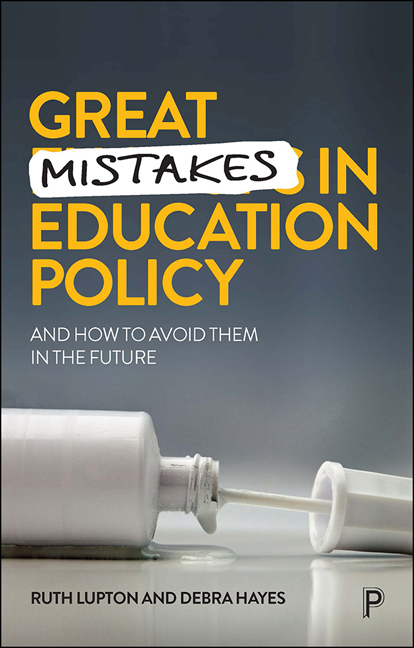Book contents
- Frontmatter
- Contents
- List of tables and boxes
- List of abbreviations
- Notes on the authors
- Acknowledgements
- 1 Introduction
- 2 Setting the scene
- 3 Tests, tests, tests
- 4 Schooling that works for some but not for others
- 5 Teachers making less of a difference
- 6 Mistake #1: turning to the market
- 7 Mistake #2: letting test scores drive policy
- 8 Mistake #3: over-prescribing teachers’ work
- 9 Mistake #4: misunderstanding educational inequalities
- 10 Mistake #5: leaving education out of education policy making
- 11 Synthetic phonics: a ‘perfect storm’ of policy mistakes
- 12 There are alternatives
- References
- Index
9 - Mistake #4: misunderstanding educational inequalities
Published online by Cambridge University Press: 23 December 2021
- Frontmatter
- Contents
- List of tables and boxes
- List of abbreviations
- Notes on the authors
- Acknowledgements
- 1 Introduction
- 2 Setting the scene
- 3 Tests, tests, tests
- 4 Schooling that works for some but not for others
- 5 Teachers making less of a difference
- 6 Mistake #1: turning to the market
- 7 Mistake #2: letting test scores drive policy
- 8 Mistake #3: over-prescribing teachers’ work
- 9 Mistake #4: misunderstanding educational inequalities
- 10 Mistake #5: leaving education out of education policy making
- 11 Synthetic phonics: a ‘perfect storm’ of policy mistakes
- 12 There are alternatives
- References
- Index
Summary
The fourth mistake that we identify is a failure to understand the causes of educational inequalities.
As described in Chapter 2, the period covered by this book has been one in which, although living standards overall have risen, inequalities have widened, labour market insecurity has increased, economic opportunities have narrowed in certain ‘left-behind’ places, and global conflicts and disasters have brought new disadvantaged populations to under-resourced urban neighbourhoods. In these circumstances, educational inequalities would be expected to widen.
Policies to create more equitable systems have featured prominently at some points in English and Australian policy history. But the approaches taken have been inconsistent and sometimes contradictory. Mostly what has been done has been insufficient, sometimes misdirected or counterproductive. In this chapter, we describe what has been done and why, and explain why overall it has failed to achieve the desired result.
Policies to tackle educational inequalities
In England, policies to address inequalities have a long history but have taken very different forms. One distinctive strand, favoured by Labour governments, has been top-up programmes and funds directed at disadvantaged places and/or groups. These started in the 1960s with Educational Priority Areas (EPAs) and additional funding to support education for EAL pupils. They were substantially increased during the Labour government's 13 years in power from 1997, with Education Action Zones (EAZs), Excellence in Cities (EiC) and City Challenges, as well as additional grants for interventions such as learning mentors and reading catch-up. In 2002, Teach First was established to attract high-achieving graduates into teaching in disadvantaged schools (see Lupton and Obolenskaya [2013] for a fuller review). However, this Labour government also deployed mainstream policies to target the most challenging areas and close gaps. As described in Chapters 6, 7 and 8, Labour's academies programme, replacing ‘failing’ schools in ‘deprived’ areas, was explicitly badged as an attempt to even up school quality, as was its National Challenge initiative and its use of floor targets and inspection. Standardisation of teaching was also motivated by making sure that children received the same input wherever they lived. Under Labour 1997–2010, redistribution of mainstream funding also became a major tool. Revenue funding for schools was increasingly bent towards those dealing with greater need, as was a new programme of school rebuilding: Building Schools for the Future.
- Type
- Chapter
- Information
- Great Mistakes in Education PolicyAnd How to Avoid Them in the Future, pp. 107 - 120Publisher: Bristol University PressPrint publication year: 2021



